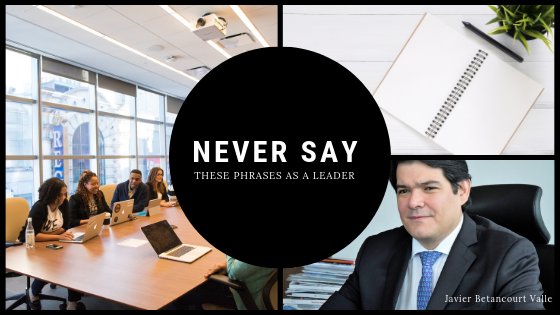In a leadership role, a lot of individuals take what you say to heart. The words you speak have an influential power that can impact your team positively and negatively. If you want to foster good relationships and trust with your team, you need to avoid saying the following phrases at all costs.
“I’m too busy right now.”
When a listener hears this statement, they take it personally. They hear “I’m too busy for you and your problems.” This statement makes it seem as if you don’t care about what challenges they are encountering and who they are as an employee.
Instead of saying that you too busy, be clear about your schedule. Explain that you are wrapped up in current obligations, but can check back in with them in the future. If they need help at the moment, provide them with an alternative person who can help/
“I don’t think you are right for this.”
A good leader will find opportunities for development for their team. This statement leaves employees feeling attacked, and their confidence severely bruised.
Point out to your team member where their try strengths are and find other options. Explain what roles you think they would excel in and question if they ever thought about pursuing that direction.
Lay out what this individual needs to do to succeed and come up with a game plan. Push this person to reach, and you might find they do a complete one-eighty.
“It’s all your fault.”
All humans make mistakes, so it makes sense that from time to time, an employee will too. Whether they are performing poorly or made a bad choice, as a leader you are still accountable for them. Placing the blame does not solve the issue nor does it help the employee.
Instead of pointing the finger, discuss what alternatives may have worked better. During this time also include how you could have helped or what you can do to prevent this from reoccurring in the future. Be sure to include that you are willing to lend your support as they move forward to implement a new solution.
“I don’t care.”
This statement can create real damage in terms of your relationship with your employee. Egotistical moments like these can be extremely toxic. If an employee witnesses you being dismissive and removed, they will do the same.
If you find what your employee is bringing unnecessary information, issues, or questions, clarify what your priorities and expectations are. Reassure your worker’s ability to problem solve on their own, but be sure to offer any resources you have. Doing so will show that you do care about them and the outcome of their situation.
Learn more about Javier Betancourt Valle by visiting https://javierbetancourtvalle.info/blog/


